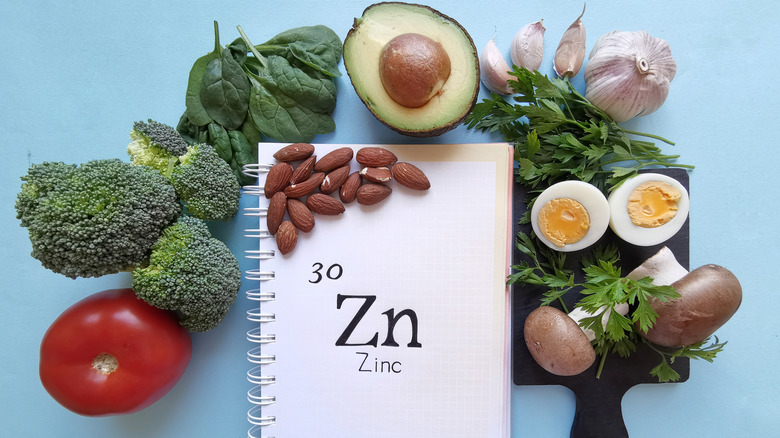Is It Safe To Take A Zinc Supplement When Pregnant?
Pregnancy often comes with many concerns about what you can and can't consume. Supplementation of vitamins and minerals is one such concern. For example, zinc is an essential nutrient that supports the immune system (via Medical News Today). This mineral contributes to wound healing and helps the body make proteins and DNA.
According to the Office of Dietary Supplements, meat, fish, dairy products, and seafood are rich in zinc. Typical examples of zinc-rich foods include oysters and beef. Alternatives for vegetarians include beans, nuts, and whole grains.
According to a 2022 review published on StatPearls, about 17% of the world population is at risk of zinc deficiency. Zinc deficiency is a major contributing factor to various conditions, including inflammation, sexual dysfunction, growth impairment, and gastrointestinal symptoms, notes the review.
As the body can't produce zinc naturally, it must be obtained through zinc-rich foods or supplements (via Healthline). It's no surprise that some pregnant women might want to take zinc supplements.
However, zinc consumption needs to be controlled since going beyond a specific threshold might trigger certain unwanted side effects. This raises doubts about the use of zinc, despite its numerous potential benefits.
Can you take zinc during pregnancy?
Zinc is mentioned in the World Health Organization's pregnancy care recommendations. Its potential benefits for pregnant women are seemingly endless.
According to a 2021 study published in the journal Heliyon, zinc plays a role in a baby's development during pregnancy. The study found a connection between low zinc intake and the risk of pregnancy complications. According to the source, the mineral is required for cell multiplication and fetal organ formation in the early stages of pregnancy. Without zinc, chromosomal and oxidative damage may occur.
Another 2015 study published in Cochrane Library reiterates these benefits of zinc. According to this study, low levels of zinc may be linked to preterm labor. However, the benefits of zinc supplementation may vary from one person to another. A huge part of potential benefits for pregnant women may largely depend on their overall nutritional status, says the 2015 study.
According to the World Health Organization, the benefits of zinc use during pregnancy have not been fully established, and more research is needed. Even though some studies support zinc use in pregnant women, speaking to your doctor before taking zinc supplements is crucial.
How much zinc can you take during pregnancy?
According to Harvard T.H. Chan School of Public Health, the recommended dietary allowance (or the amount of zinc you should consume daily) may vary based on gender and age. Generally speaking, an RDA of 11 mg is ideal for adult males, while most adult females may only need 8 mg.
According to the source, pregnant and breastfeeding mothers often require higher amounts of zinc daily — about 11 mg and 12 mg, respectively, will suffice. Despite these recommendations, it's crucial to consult your doctor for a proper dose that works for you.
According to WebMD, side effects often occur when you increase your dose beyond 40 mg daily. These side effects often manifest depending on how you take zinc supplements, and how much you take.
In high doses, oral supplementation of zinc might upset your stomach and make you nauseous. Fatalities can occur when taking single doses of 10-30 grams. You can also experience burning when you apply it on broken skin or permanent smell loss after inhaling zinc through the nose.
Excess amounts of zinc can also interfere with how your body absorbs copper and can cause iron deficiency anemia, sideroblastic anemia, and neutropenia (via Healthline). Excessive zinc may also decrease good cholesterol.
March of Dimes recommends getting the majority of your zinc intake from a healthy and balanced diet. Talk to your doctor about the foods and supplements you should consume to make sure you are getting the minerals you need for a healthy pregnancy.



